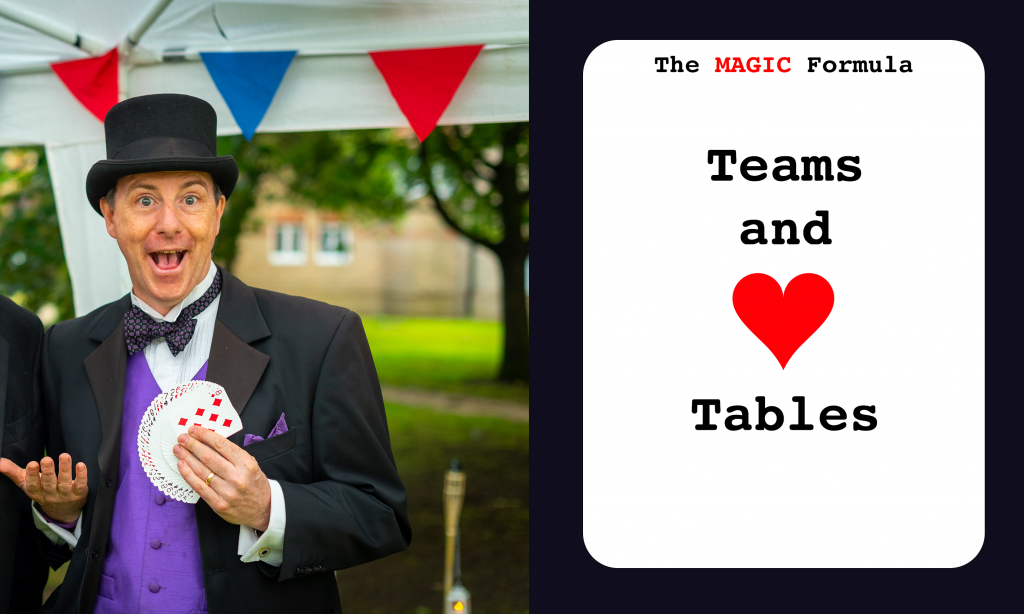
The MAGIC formula:
Moving
Attuning
Giving
Inspiring
Connecting
—
I have been working as a close-up magician for the last 25 years. I have entertained at thousands of events – hundreds of tables at weddings, corporate parties and significant birthdays.
At the same time, in the other half of my life, I have led and been a member of several teams. Recently, I have been interviewing many other team leaders about their experiences and challenges. Many thanks if you are one of them!
I have observed that many of the challenges facing a close-up magician approaching a table of guests are very similar to those facing team leaders. I have also realised that the MAGIC formula may be applied in both situations.
—
“Watch your Watch“
Any magician who works at weddings, family events or corporate events will be very familiar with the lines “Hold on to your wallets”, “Watch your watch,” and “Can you cut my husband in half?” These are the lines of the Joker, present in almost every group.
On our imaginary wedding table, the Joker is Jake, the father of enthusiastic Matilda and bored Ben.
You may well have a Joker on your team. You may love them, or they may irritate you beyond belief.
Jester Minute
How do you deal with a Joker?
A jester was an essential part of the mediaeval court. They were the ones who could speak the truth to the king like no one else. Of course, they had to make sure they didn’t step over the line, otherwise, they might lose their heads. But they were able to go further than anyone else in the court. Think of the fool in King Lear. The jester is there to burst the bubble of pomposity, to stop monarchs from taking themselves too seriously.
Do you have a jester on your team? They may be an inexperienced or experienced jester, but they will have much to add.
Kind to the Clown
I have to admit that I am writing from the point of view of being a joker myself. I have always been that way, always loved wordplay. Over the years, I have learned to apply a filter so that I don’t share every single pun that comes into my head. But it is my mental reflex action. My family and colleagues will testify that the filter stops working when I am tired!
So my plea to you is, please treat your jokers/ jesters kindly.
As a magician working a wedding table, when I encounter a joker like Jake, my initial reaction is, as with so many challenging personality types, to try to block them or compete with them, to use a clever put-down to make myself look better. I have to resist this unless they are seriously disrupting the show. I can acknowledge the joke kindly, move on and make them feel included.
Likewise, if you have a Joker on your team, you might find that they irritate you. Maybe they don’t share your sense of humour, or it may be that they are not filtering very well? Instead of blocking them or competing, think about how you can offer feedback in a kind and gentle way, away from the rest of the team. Perhaps you could let them know how their jokes make you feel or how you’re finding them distracting and ask them to just dial it back a bit?
Top comedians spend years trying out material and dying on stage multiple times in clubs. Your team Joker has not had that experience. So kind feedback will help them to improve their style.
The Source of Great Amusement
Have a think about what might be driving your Joker. The truth is, you really don’t and can’t know exactly. And people make jokes for all sorts of motivations. It could be defensiveness; they could be shy and employing a coping mechanism. They could have some kind of unconscious insecurity, or they’re avoiding pain of some sort.
It could be their way of oiling the cogs of team relationships. I once worked in a multiple-office setup. I used to bounce around the other offices and chat with people every now and then and make them laugh. One of my colleagues actually said thank you, that I lightened the burden of the day by distracting them momentarily and taking their mind off the serious business they were engaged in most of the time.
Can you affirm your Joker in the same sort of way? Bear in mind that they may be utterly unaware that they are being embarrassing or awkward, and they need sensitive feedback to learn this.
Sensitive Censoring
Looking around the wedding table, Jake’s teenage children will probably be rolling their eyes at his jokes and his wife might look embarrassed.
There are different types of humour. If it is cutting and cruel, then you have a problem, and there could be some sort of relationship or attitude problem that might need further investigation. However, maybe they are simply using stock lines or engaging in wordplay. In that case, it may be worth recognising the lateral thinking that is going on and their ability to look at life sideways and make connections that you don’t. This kind of thinking can be invaluable for a team to open up new avenues for exploration. You really want to avoid killing any creativity.
So treat your Jokers gently, nurture the good side and give gentle feedback.
Every team needs its jester.
—
Help Please!
I would like to interview even more team leaders to gain insight into the challenges they face. This is so that I can design an effective resource for use by team leaders in many different situations. I am talking to leaders of both permanent and temporary teams.
The research involves a 15 minute Zoom call. Thank you to those who have already done it – much appreciated!
Please pass this on to any team leaders that you know.
If you are a team leader and would like to help, please book in here:
https://www.work-life-magic.com/magic-for-teams-research/

